Carbon tax is to increase by €7.50 to €71 per tonne of CO2 emitted, which will be applied to auto fuels with effect from tomorrow, and to all other fuels from 1 May 2026.
The Government said the additional revenue arising from the carbon tax increase is estimated at €121m in 2026, and the full-year additional yield is estimated at €157m.
Increases in the carbon tax every year out to 2030 were legislated for in Finance Act 2020. The target is to ensure the tax on carbon emissions reaches €100 per tonne by 2030, in order to encourage people to transition to cleaner fuels and help achieve Ireland’s binding climate action targets.
Announcing Budget 2026, Minister for Finance Paschal Donohoe said “this revenue will be ring-fenced to ensure that the carbon tax policy is progressive”.
“We will spend this revenue on social welfare measures and other measures to prevent fuel poverty and to ensure a just transition; a socially progressive national retrofitting programme, and funding to encourage and incentivise farmers to farm in a greener and more sustainable way.
“This will include, for example, increased allocations for the Warmer Homes Scheme, which provides completely funded retrofits to low-income households.”
The €5,000 VRT relief for electric vehicles is being extended by one year until the end of 2026.
The Accelerated Capital Allowances schemes for energy efficient equipment, and for gas vehicles and refuelling equipment, is being extended for a further five years until the end of 2030.
Watch: Minister Paschal Donohoe announces that carbon tax is to be increased to €71 per tonne of CO2 emitted
Department of Climate, Energy and Environment allocated €1.1bn for 2026
Meanwhile, the Department of Climate, Energy and the Environment has been allocated €1.1bn for 2026.
This includes €558m in carbon tax revenue for residential and community energy upgrade schemes, and the continued investment in retrofitting public buildings.
It also includes €209m which will go towards the climate action and environmental leadership programme to support climate objectives and enhance biodiversity.
“Within this, €82m has been prioritised to support a Just Transition for the wider midlands region,” Mr Chambers said.
“Projects include decarbonising rural bus routes, support for private bus operators to transition to electric vehicles, wetland restoration and support for nature and biodiversity,” he added.
However, Deirdre Duffy of Friends of the Earth said that this was “not a climate budget”.
She said that while Ireland is in the middle of a biodiversity crisis, nature has been specifically excluded from this Budget.
Ms Duffy added she welcomed measures to reduce energy use, but that there was nothing in this to target polluters such as aviation and SUVs.
She said that rural retrofitting was key as Ireland needs to be building resilience across the social fabric, but that rental properties were also in need of retrofitting.
Tax disregard for households selling electricity back to grid to be extended
The income tax disregard of €400 for income received by households who sell electricity from micro-generation back to the grid is being extended for a further three years to the end of 2028.
The Government will provide €1.4bn to Uisce Éireann in 2026 to support new housing developments and to improve the country’s water supply.
“This will help to further progress development of waste treatment plants across the country,” said Minister for Public Expenditure Jack Chambers.
In his budget speech, Minister Chambers announced €3.5bn to the ESB and EirGrid to strengthen energy security and accelerate the country’s transition to renewable energy.




